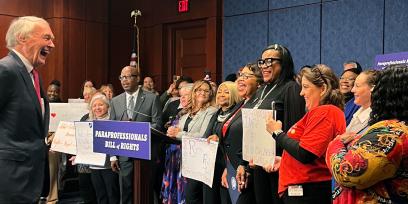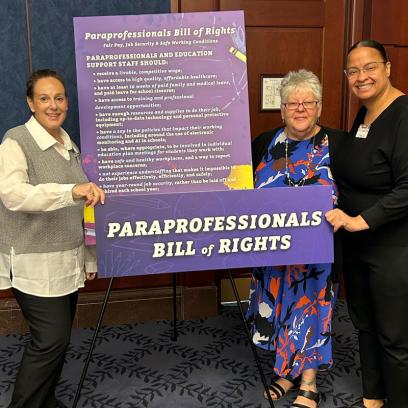Surrounded by PSRP leaders from across the nation, Sen. Ed Markey (D-Mass.), with co-sponsors and fellow senators Elizabeth Warren (D-Mass.) and Bernie Sanders (I-Vt.), has introduced a sweeping resolution on workplace rights for paraprofessionals and school-related personnel. The measure, calling for fair wages, paid leave, full benefits and safe working conditions, was introduced Nov. 6 on Capitol Hill to fanfare from both the American Federation of Teachers and the National Education Association.
The resolution recognizes the important role school and college staff play in students’ lives, AFT President Randi Weingarten said at a news conference with Markey.
“This bill of rights is about making sure there is dignity and respect for the righteous work you do every single day,” Weingarten said. “I am grateful to Sen. Markey because he believes in investing in us.”
Weingarten recalled that when the AFT first started representing PSRPs, they were paid about a dollar an hour. “And look at where we are now,” she said: Some locals have career ladders, retirement benefits, healthcare insurance and even some paid leave. But those benefits are not in place everywhere, regardless of whether the local has collective bargaining strength. It is long past time for schools and colleges to pay school employees fair wages and benefits, she said. “You think they could do the job without PSRPs? The answer is a big no.”
Markey said that when he was a young man, he worked as a substitute teacher for a year and saw firsthand the hard work that support staff do, usually as the most diverse staff and sometimes as the only heritage language speakers on campus. He lamented that PSRPs are a “manufactured underclass” of school employees.
But he added that when school and college support staff are strong, then communities are strong, pledging his solidarity and commitment to PSRPs’ futures. “Let’s fight together for what you deserve,” he said.
Together with emerging PSRP leaders, members of the AFT PSRP program and policy council (PPC) then fanned out across Capitol Hill to meet with their members of Congress. Each delegation raised two or three top concerns, including House Republicans’ plan to slash Title I funding by up to 80 percent as part of next year’s funding package. They talked about what it means to be a PSRP and stressed the importance of federal funding for schools and colleges.
The activists also asked their representatives to support the House PARA act, H.R. 4550, and the Senate’s PSRP bill of rights, S. Res. 450. They explained to the senators, representatives and congressional staff the nature of their jobs, whether they work as food service workers, custodians, IT technicians, office staff, bus drivers or classroom assistants. And they asked for the resources to maintain adequate staffing while doing their jobs safely—in other words, they demanded real solutions for their students and communities.
Inequity brings tragedy
Despite having champions in the House and Senate, PSRPs do confront stark inequities on the job, like lack of healthcare insurance.
PPC co-chair Carl Williams, a school custodian from Los Angeles and also an AFT vice president, laid out exactly what’s at stake if school staff must keep working without healthcare coverage.
Cathy Pierce, a health clerk and an officer in the Lawndale (Calif.) Federation of Classified Employees, worked for decades in a typical PSRP job with no health benefits, Williams said. By the time Pierce landed a position with benefits, she learned on her first visit to the doctor that she had cancer. She died within a year.
The irony is tragic: Having worked her entire career making sure kids were healthy, Cathy Pierce died because she didn’t have healthcare.
Williams thanked the members for their visits to their representatives “because they won’t know our stories unless we tell them.”
PPC co-chair Shelvy Abrams, past chair of the paraprofessionals chapter of the United Federation of Teachers in New York, dubbed any Hill visit by PSRPs “a very successful meeting for them to tell us how they remembered what we did during COVID-19.”
Emerging leader Monique Anderson from Toledo, Ohio, was super impressed with her Hill meeting because the staff member asked questions for clarity, asked about students’ mental health, asked about school and college staff shortages, and asked why special education paras don’t always get to sit in on their students’ IEP meetings. “We thought we were ready for him,” Anderson said, “but he was ready for us.”
The PSRPs extracted lots of promises. They are planning to follow up with calls and letters—and they know they have their national union as backup.
“Now you know how important this is, and that it can be done,” Abrams told them. “I am very proud of all of you.”
[Annette Licitra]


